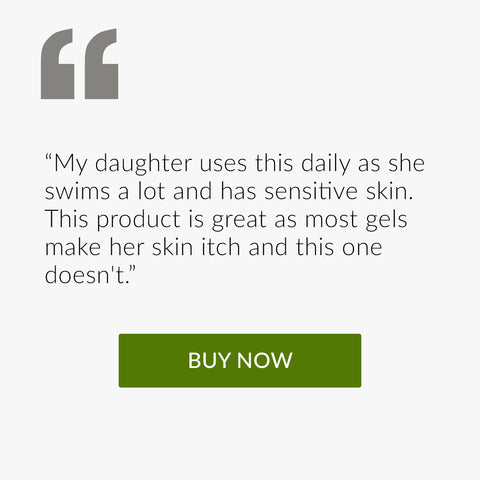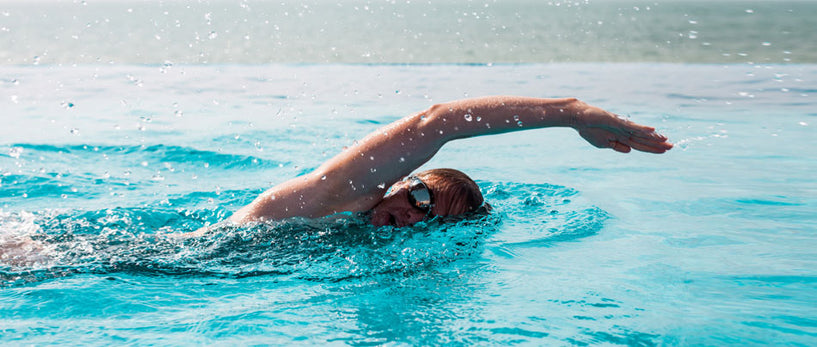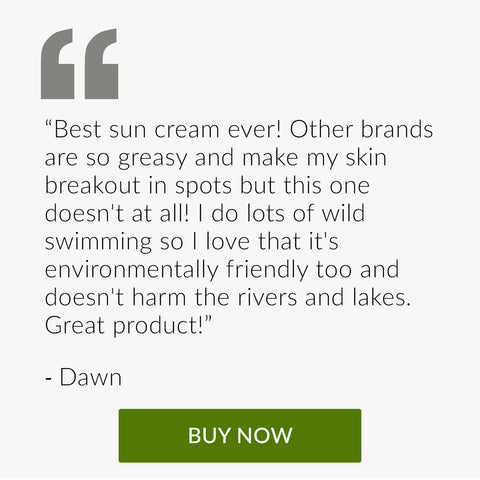Swimming is a great cardiovascular exercise and a wonderful way to take some ‘me time’ but if you find that it impacts the health of your skin and hair, we can help you to choose a shampoo, shower gel and skin care for after swimming.
Green People’s natural and organic beauty products are filled with plant goodness and are kind to sensitive skin – perfect for everyone!
Jump in here and explore our skin care for swimmers.
Skin care tips for swimmers
Dry skin is a real downside of swimming and if you swim in a chlorinated pool, you might find that chlorine can make your skin feel tight and dehydrated. If you are prone to eczema or sensitive skin, you may find your skin is particularly affected by swimming.
Jordan works on our customer care team and is also a registered swim coach. Here are some of her top tips for keeping your skin comfortable after swimming.
- Shower before and after swimming. Help to stop chlorine from clinging to your skin by thoroughly drenching the hair and skin in water before swimming. After swimming visit the showers again and use shower gel and shampoo to wash your body and hair thoroughly. Don’t forget to also cleanse chlorine from your face with a gentle cleanser or face wash.
- Suit up. It’s advisable to wear a rash vest when participating in water sports or snorkelling, but those with sensitive or sun-sensitive skin may also benefit from wearing UV-protective clothing when simply swimming in the sea or in chlorinated water.
- Check your skin. If you have eczema or sensitive skin, follow the advice of The National Eczema Society and monitor how your skin reacts to chlorine. If you notice that your skin is feeling uncomfortable, get out of the pool.
Read on to discover gentle, natural skin care for swimmers to leave your face and body soft, nourished and rehydrated.
Cleanser and moisturiser for swimmers
Put back what chlorine took out with a short skin care routine after swimming.
Firstly, cleanse your skin thoroughly with our bestselling Gentle Cleanse. This purifying, creamy cleanser contains organic Aloe Vera, hydrating Squalane and vitamin-rich Shea Butter which work together to leave skin feeling clean and soft.

Gentle Cleanse & Make-Up Remover 150ml
Soft, clean skin starts with our bestselling cleanser£29.00
Always follow your cleanse with a moisturiser after swimming. Your skin will need nourishment and rehydration after being in chlorinated water.
To make it easy for swimmers to replenish moisture in skin that feels tight after swimming, all our moisturisers are pH-balanced and rich in hydrating plant actives. They are also free from ingredients known to contribute to skin dryness, including ethanol alcohol.
We recommend using a Squalane moisturiser after swimming as this nourishing, eczema-friendly active is known to help skin to retain moisture and seal it into the skin.
We love our beautiful Vita Min Fix moisturiser for swimming. With hydrating Squalane and Shea Butter combined with rejuvenating Baicalin, this bestselling face cream contains a feast of goodness for skin.

Vita Min Fix 24-Hour Cream 50ml
Want to give your skin a daily boost? This is the moisturiser you need£27.00
If you have sensitive skin, we recommend choosing from our Sensitive collection. These scent-free products have been created to be as pure and gentle as possible and are perfect for using after swimming.

Shower gel after swimming
If you prefer to luxuriate in the natural aroma of essential oils by using a scented shower gel after swimming, we have a selection of beautifully scented body washes for you to choose from.
All of our organic shower gels are made with soothing Aloe Vera and without harsh foaming agents. They leave skin soft and rehydrated, and gently scented with natural fragrant oils.
View all shower gels for after swimming.
Body lotion for swimmers
Water has a different pH to human skin which means that a long swim will leave most skin types feeling imbalanced, whether in a swimming pool or open water swimming.
If your skin feels dry and tight after being in the water, use a pH-balanced body lotion after swimming, such as Protein-Boost Hand & Body Lotion for dry or sensitive skin.
Featuring hydrating Squalane, moisture-retaining Marshmallow and exceptionally nourishing Perilla Oil, this organic body lotion soothes away dryness and leaves skin scented with Citrus and Ginger.

Protein-Boost Hand & Body Lotion 200ml
Lock in hydration as you nourish dry skin with this natural body lotion£28.00
If you’ve been working hard in the water, why not care for dry skin and achy muscles after your swim with Alexandra Kay Time to Restore Magnesium Lotion?
A natural magnesium lotion to soothe tired muscles after exercise, this body lotion soothes skin after swimming with CB2-Skin™ Biofunctional and uses a moisture matrix of Red Algae and Rice to lock in hydration and reinforce the skin barrier.
It also uses a blend of ten essential oils that smell divine and are ideal for masking any lingering scent of chlorine.

Alexandra Kay Time to Restore Magnesium Lotion 200ml
Discover a soothing place with our Magnesium body lotion£42.00
Sun cream for swimmers
Looking for a marine-friendly sunscreen for swimmers? Our Scent Free Facial Sun Cream SPF30 is perfect for protecting your face when swimming in the open.
Made with organic Aloe Vera, soothing Cocoa Butter and prebiotic Inulin, it keeps skin nourished whilst defending against UV rays with safe, non-toxic filters.

Scent Free Facial Sun Cream - SPF30 50ml
Shield and hydrate with this facial SPF. Ideal for dry or sensitive skin.£29.00
If you need a full body sun cream for swimming in the sea or in rivers, our water-repellent Scent Free SPF30 Sun Cream is a great choice.
It is made without the chemical ingredients that are known to pose a threat to marine species and we donate to the Marine Conservation Society each time one of our full-size, scent-free sun care tubes is purchased.

Scent Free Sun Cream SPF30 200ml
Protect sensitive skin naturally with our best-selling SPF30 sun cream£32.50
We also offer a Sports+ mineral sun cream as part of our Green People for Men collection. A water-repellent mineral sun cream with SPF30, this facial sun cream comes in a 50ml pump which is perfect for carrying with you when going surfing, swimming, or preparing for a triathlon.

Green People for Men No.4 Sports+ SPF30 Sun Cream 50ml
Hydrate and protect with this facial SPF. Great for men of all ages.
Regular price
£31.50
£15.75
Jordan says: “If you’re swimming outdoors, you should first apply a water-repellent sun cream. Neither a wetsuit nor a rash vest will cover the entire body so if you are swimming in the sea, apply a water-repellent sun cream liberally to exposed skin 20 minutes before you get in the water, and reapply once you get out.”
Shampoo and conditioner for swimmers
Swimming pool chemicals can leave hair feeling dry and frizzy and may discolour hair dye, but you can avoid this by protecting your hair with a shampoo and conditioner after swimming.
Jordan says: “Investing in a good swim hat is a good place to start and helps to protect your hair from chlorine damage. Washing the hair immediately after swimming can further help to minimise damage.”
If your hair has been damaged by chlorine, Green People’s Protein-Boost Shampoo and Conditioner are the perfect hair care products to use after swimming.
Rich in Quinoa protein to strengthen damaged hair and protect colour, this chlorine damage repair hair routine uses Artichoke to shield hair from damage. As well as having impressive protective properties, Artichoke is rich in antioxidants that defend against UV damage – perfect if you spend a lot of time swimming outdoors.
You can use this shampoo and conditioner after swimming every time you visit the pool. To give dry hair an extra moisture boost, leave the conditioner on and wrap your hair in a warm towel for 10 minutes. Once the 10 minutes is up, thoroughly rinse the hair to reveal soft, easy to comb hair.
Would you like help finding hair care, skin care or shower gel after swimming? For help finding the ideal post-swimming products for your skin type, please contact our friendly UK customer care team at organic@greenpeople.co.uk or on 01403 740350.
If you wish to republish this content, please credit Green People as the original creator with a link to "Skin care tips for swimmers". Please do not use an affiliate link.






























